Blanche Burley / Cole
Blanche's mother, Charlotte Bell,
married Richard (Dick) Burley in London. Blanche was born at Islington, London
on the 11th
of December 1870. The following year the family emigrated to Napier, New
Zealand. Dick's parents followed them out sometime later. Charlotte's sister
Isabella arrived in Napier in 1874.
Charlotte and Dick produced eight
children, naming the first five alphabetically: Amy, Blanche, Constance (known
as Minnie), Dharma and Ethel. They christened the last three May, Claude and
Violet (known as Vi).
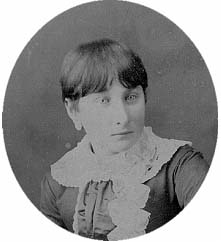 Amy
and Blanche were four and two years of age respectively when they arrived with
their Mother in Napier on the sailing ship Ballarat, 15 September 1872.
The rest of the children were born in New Zealand. Blanche remembered being the
centre of attention with the sailors on board ship as she sat on her potty,
tilting from side to side to stay upright with the movement of the ship. Dick
had arrived earlier to organise for his family's arrival. After a voyage of
three months she did not recognise her father and became alarmed when her mother
embraced this strange bearded man at the bottom of the gangplank.
Amy
and Blanche were four and two years of age respectively when they arrived with
their Mother in Napier on the sailing ship Ballarat, 15 September 1872.
The rest of the children were born in New Zealand. Blanche remembered being the
centre of attention with the sailors on board ship as she sat on her potty,
tilting from side to side to stay upright with the movement of the ship. Dick
had arrived earlier to organise for his family's arrival. After a voyage of
three months she did not recognise her father and became alarmed when her mother
embraced this strange bearded man at the bottom of the gangplank.
Here is an extract from a letter
Blanche wrote from Te Kuiti to cousin Kathleen in Ireland, dated 30 August 1952:
My father and Mother came out to
New Zealand in the very early days with us two girlies - Amy, the eldest was 4
years and myself 2 - emigrants - everyone had to be prepared to rough it, and do
the best they could to earn wages and get settled in some tiny rough homes - my
father was a first-class coach builder and he was an only child, so he got a
good education - (for Londoners) so he soon got a good position and got on his
feet. His father and Mother, too came out to NZ - his father was a coach-smith,
so he too soon got a good job. We were all very fond of our Grand Dad, he was so
full of fun and playing tricks on us, we loved him dearly.... Father was among
the last lot of soldiers, called up, to fight the Maoris but it all ended, in
"speeches" & plans - instead of using guns, and everyone was very happy, no more
lives lost.
Dick Burley, pictured in the following
photograph, is said to have taken part in the last battle against the Taranaki
Maori. The story goes that he was drunk on departure from Napier and gave those
assembled to farewell them a lusty rendition of the song, "Just Before The
Battle Mother." On his return, he reported that they had stormed a fortified pa
but found only pigs in occupation. Dick referred to it as "The battle of the
pig shit!"
(See end
note)
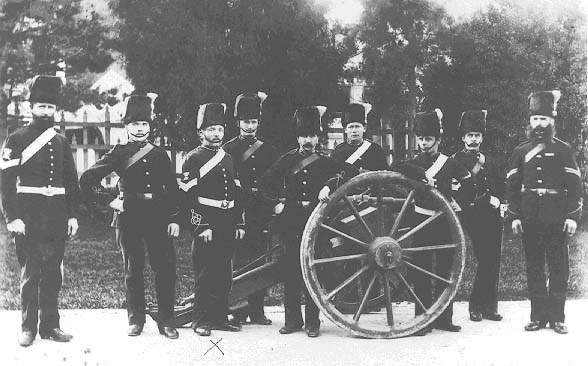
Dick Burley (fifth from the left)
Blanche remembered when she was a
child being hoisted on to her father's shoulders above a crowd of spectators to
see Te Rauparaha parading through Napier. It was probably Tamihana Te Rauparaha,
an early crusader for the Maori King movement, son of the infamous old cannibal
chief of the Ngatitoa.
By 1882 the family had moved to
Wellington and then Nelson where May was born. Dick's parents probably remained
there for the rest of their lives and Blanche occasionally visited them there.
Dick and his family later moved to Auckland where Claude was born in 1886. Violet
being born in Napier in 1888 indicates that by then they were back there for
good. The 1993 Electoral Roll has the Burleys at Beach Road (Marine Parade) and
they are listed in the Napier Almanac for 1894.
Blanche vividly recalled the
consternation of Napier residents during the eruption of Mt Tarawera in 1886,
when many believed that the explosive detonations they were hearing were from
Russian ships shelling Auckland.
Dick Burley worked for many years as a
coachbuilder for Mr J K Boon, producing very fine traps and landaus. He helped
build a miniature coach for presentation to Queen Victoria in England. He carved
the wooden cross that topped the old Roman Catholic Church in Napier. This
beautiful building was refurbished in 1967. Collin James remembers visiting it
and marvelling at the workmanship of the carvings.
Just a fortnight after the completion
of the restoration the building fell victim to a fourteen-year-old arsonist.
Richard Burley's cross survived as it fell clear of the fire when the steeple
toppled. It possibly survives in storage but enquires with The Hawke's Bay
Museum have drawn a blank. Dick became one of Napier's great characters who
loved nothing more than dressing up and was always the star turn at the town's
"Madi Gras." He was a very sociable person and a heavy drinker in his earlier
years. This was possibly why Blanche and her sisters developed their strong
temperance attitudes. They were eventually responsible for their father's total
reform.
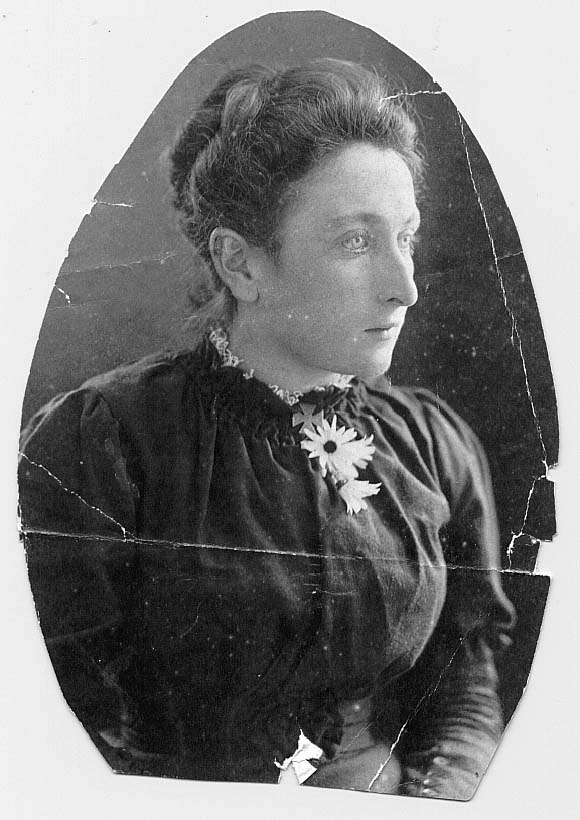
Blanche Burley
Blanche remained an active member of
Woman's Temperance most of her life.
A newspaper report dated 24 July 1895
says in part:
The Bond of Unity Lodge
presented their late secretary, Sister Blanche Burley, with a beautiful
medallion gold brooch, exhibiting a Maltese cross, anchor, hand and heart, made
to order by Mr F W Collins, jeweller, of Napier, and was of exquisite
workmanship, reflecting much credit on the manufacturer. There was also
presented to Miss Burley a splendid dinner service.
Miss Burley has greatly
distinguished herself in connection with the working of the lodge for many
years, adorning every office she held by her efficiency and amiability, and it
was fitting that the lodge should recognise her valuable services by tendering
her these tokens of her esteem.
The address recorded the
genuine and hearty congratulation of the lodge members on the auspicious
occasion of her marriage, and testified to Sister Burley's well known
indefatigable efforts in the cause of temperance generally.
Lodge Deputy Bro R Burley
thanked the lodge for its generous recognition of his daughter's services.
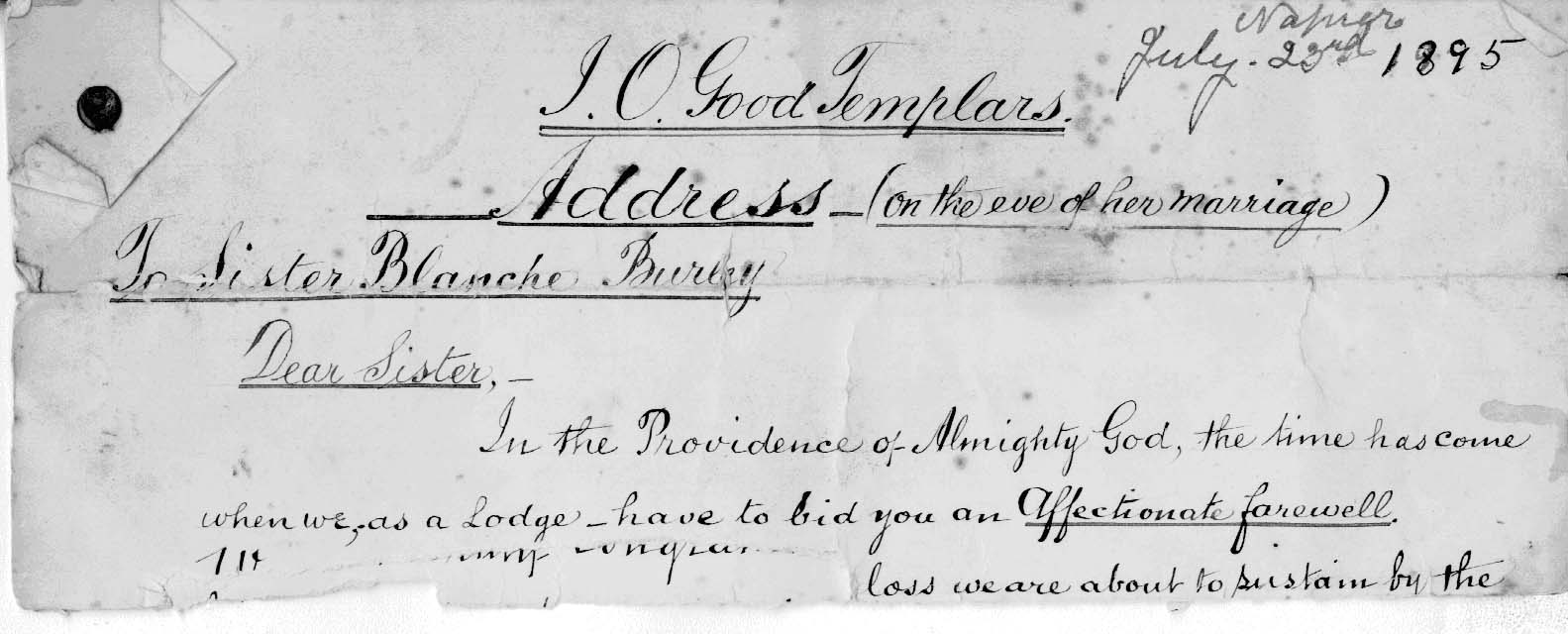
Blanche
and her sisters may have been Suffragettes. A Napier partition asking for the
vote for women, dated 1893, includes the signatures of:
Charlotte Burley
Blanche Burley
Dharma Burley - all of Beach Road
Amy Davis
Sarah Robson - both of Enfield Road
New Zealand women lead the world by
winning the right to vote about 14 years later.
Charles Clifton was Blanche's first
cousin
- their mothers
were sisters. Apparently he was in love with her. In a letter to a relative
written by Blanche from Te Kuiti, dated 24 July 1952, she says:
I could
have married him, he tried for years to win me over
- but I loved my old Bob Cole the best, no he
(Bob) was young then and so very handsome.
Charles Clifton ended up marrying
Blanche's sister Amy in 1897.
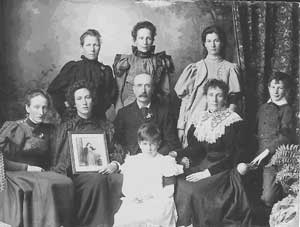
Blanche ~ Ethel ~ Dick Burley ~ Charlotte ~ Claude
Violet
picture Constance (Minnie)
The family portrait (circa. 1900)
shows Ethel holding her sister Minnie's picture. Minnie married William John
Harrington-Paine in Auckland on the 19th of July 1892. His address is recorded
as Neilghanny, India (note I think this should be
Neilgherry now know as Nilgiri).
It is assume they went to England where Minnie died at quite a young age. It is
probable that this photograph commemorates her death as Dharma, Claude and Violet
are wearing black armbands and the others have black neckties. Richard has both.
Charlotte was a lace and dress maker
and their beautiful clothing is evidence of her and her daughter's skills.
Blanche wears a hair arrangement of fine lace.
Blanche married Robert
(Bob) Bell Cole in Napier on 24 July 1895. She was 23 years 5 months of age and
he nearly 34
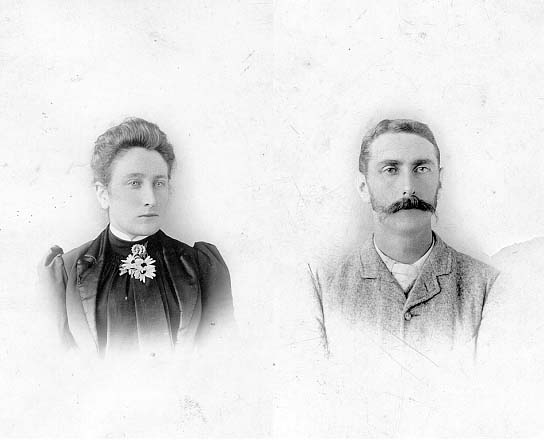 Bob
was from near Clones, across the border in County Fermanagh, Northern Ireland.
He spent his first four years in New Zealand on the Chatham Islands. He then
worked in the Northland kauri bush as well as doing various shepherding and
shearing jobs both there and in the Hawke's Bay. He used to reckon that Blanche
was the most beautiful woman in Napier and he had absolutely no idea why she
agreed to marry him. They evidently made a pact whereby, from that day forth,
Bob would never drink in their home and she would never broach the subject of
religion. They stuck to their vows. Some of Blanche's family and friends were
less than enthusiastic at the prospect of her being dragged away into the
wilderness by an apparent heathen. They first lived at Moawhango near Taihape
which was a place of considerable isolation, virtually cut off from the world
during winter. The contrast for Blanche, who was a town girl, must have been
considerable. Even Bob referred to the region as the "abomination of
desolation."
Bob
was from near Clones, across the border in County Fermanagh, Northern Ireland.
He spent his first four years in New Zealand on the Chatham Islands. He then
worked in the Northland kauri bush as well as doing various shepherding and
shearing jobs both there and in the Hawke's Bay. He used to reckon that Blanche
was the most beautiful woman in Napier and he had absolutely no idea why she
agreed to marry him. They evidently made a pact whereby, from that day forth,
Bob would never drink in their home and she would never broach the subject of
religion. They stuck to their vows. Some of Blanche's family and friends were
less than enthusiastic at the prospect of her being dragged away into the
wilderness by an apparent heathen. They first lived at Moawhango near Taihape
which was a place of considerable isolation, virtually cut off from the world
during winter. The contrast for Blanche, who was a town girl, must have been
considerable. Even Bob referred to the region as the "abomination of
desolation."
Their honeymoon was the
tortuous journey of one-hundred-and-forty kilometres up onto the volcanic
plateau, climbing something like eight hundred metres above sea level. The first
day saw them reach the hotel at Kuripapango from where they intended to catch
the weekly coach next morning but were held up by a severe snowstorm
There they remained stranded for a full week and spent
their time climbing the surrounding hills. Blanche referred to them as
"mountains"
- a more accurate
description of what they looked like in winter. Bob would leave Blanche to rest
and climb on up to the highest peak he could. From her viewpoint he looked like
a mere speck and his return was always a great relief. He was certainly an
adventurer.
At Moawhango, Bob ran the general
store for Messrs Ellis Bros and Valder and in twelve years of employment with
them he successively managed stores in Mataroa, Taihape and Ohingaiti. In
Hunterville Bob shared a butchery that had a reputation for handling only the
highest quality meat. His father-in-law built him a sturdy wagon for the
business. It was a settled period of their early life and Bob became active in
local affairs, serving on the Town Board, Library and School Committee. He was
appointed a Justice of the Peace in 1905. A keen exponent and supporter of Rugby
football, Bob was one of the many enthusiasts who by voluntary effort and the
sheer hard work of logging, stumping and burning, cleared a heavily wooded flat
to create the first playing field in Taihape.
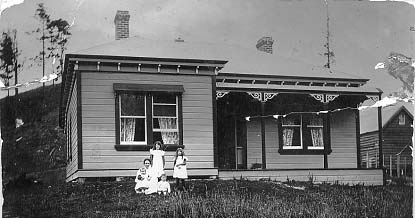
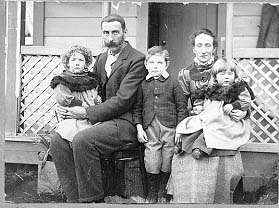
Bob and Blanche with Thelma aged 3½, Jack 5, and Lottie 2, at their residence in
Taihape or perhaps Hunterville
They eventually had six children,
Jack, Thelma, Lottie, Bill, Dick and Mac.
Blanche spent untold energy and time
looking after other people. She used to help Maori women during childbirth - a
practice frowned upon by some of the other white settlers of the time. Local
Maori held both she and Bob in great respect, often greeting them with the words
"Ka pai, Mr. and Mrs. Bob!"
They moved up to the Paraketu Valley
near Waimiha, mid-way between Taumarunui and Te Kuiti in the King Country, where
they took up an eight hundred acre block of bush-clad hill country. Blanche was
forty-one and Bob fifty-nine years of age!
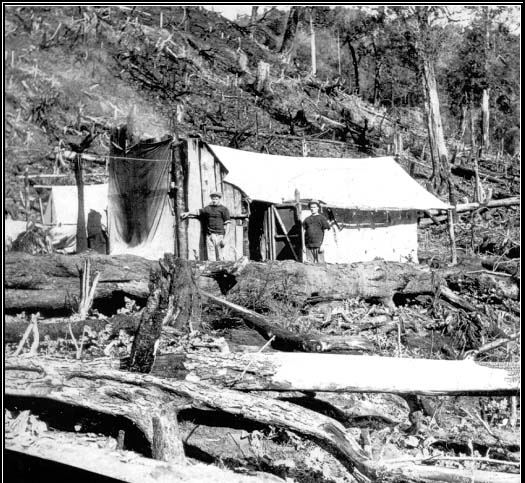
Neighbours, Len Parkes and Bill
Gillespie
stand in front of Cole's main tent
The family
first lived in three ridge tents. Water had to be carried in buckets from a
stream and the cooking done at one end of the main tent in three camp ovens in a
huge open fireplace above which was suspended a large kettle for hot water. This
tent had a wooden floor and the kitchen area was lined with vertical slabs of
split timber with canvas against the fireplace end to keep wind from blowing
through the cracks.
The other end
was partitioned off as the parents" bedroom. In-between was a living and dining
space along one side of which they stored their saddles and bridles.
An air space
between the tent roof and the tent fly prevented condensation being a problem
and kept the interior cool in summer. Behind was a boys" tent and a girls" tent,
one of which contained a seldom-used colonial oven.
They improvised for many of their
requirements. They swept the floors with a broom made by sliding a length of old
sock down a branch of manuka to hold the brush part together. Flour bags
provided the material for undergarments.
The only other structure on the
initial clearing was a set of sheep yards. Bush was felled, burned and the land
sown in grass. There was always plenty to be done and all the family were
expected to work hard. From 1916, Bob worked part-time as a land valuer. With
her husband frequently away, it was no easy task for a mother coping with the
primitive conditions and caring for infant Mac, who was literally born in a
tent. Blanche always worried that one of the men or her children would be killed
or injured in the hazardous environment.
For a period of six months she
fostered two neighbour's children, Pearl and Thelma Parkes. Thelma was just a
babe in arms. Their mother was having difficulty recovering from a chronic ulcer
that had eaten into her hip that in later years left her lame in one leg. Pearl,
who was three
- a bit older
than Mac, has fond memories of their kindness and still refers to them as "Mummy
and Daddy Cole."
Accustomed to living in
bush camps for many years, Bob was probably quite content to carry on living
under canvas forever. However, his hand was forced when Mac became seriously ill
with diphtheria. Neighbours Len Parks and Oliver Gillespie milled a large Totara
behind the sheep yards from which they built the house
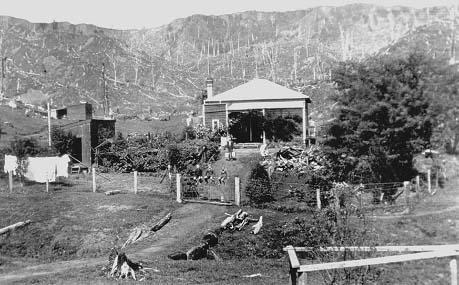
Dick carrying kerosene tins ~
Thelma cutting wood
Leo & Gilbert McKay (cousins) & Mac
Pearl Waldren (nee Parkes) said that
on the rare occasions that Blanche was able to get out she always rode side
saddle on a good safe hack called "Brownie." (It was not fashionable in those
days for a woman to ride astride but the necessities of colonial life soon
dictated a change.) Periodically "Mummy Cole" would gather up a basket-full of
socks and visit Pearl's mother and would sit working her way through them as
they talked. The needle flew up and down at a terrific rate
-
she was an expert darner. Pearl and Mac would amuse themselves outside making
mud pies that little sister Thelma Parkes would tramp on to break them up. They
were wonderful days for children.
Blanche's sister Violet and her
husband James moved with her two small boys, Gilbert and Leo, to live in the
dwelling at the back of the Cole's place at Paraketu. They were there for a
number of years. She parted from her husband James fairly soon after leaving the
valley.
In 1924 Bob and Blanche retired to a farmlet of
twelve-and-a-half acres at Mangarino Road, Te Kuiti. For a while Thelma and her
husband Jim ran the Paraketu place and then later, Bill and Nelly Cole took over
the management. They used to move sheep from Waimiha to the Te Kuiti property to
fatten for sale, so Bob still had plenty to do. Blanche continued to cook over a
coal range and had to boil up the copper for clothes washing.
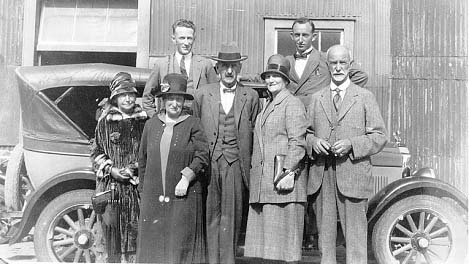
Dick ~ Alec
Mary ~ Blanche ~ Bob Cole ~ Minnie ~ David Cole
Her garden plots produced abundantly
in spite of her methods being criticised by male members of the family. Rather
than digging, she just scratched about on the surface and was little concerned
with staking or pruning. The garden paths were sprinkled with coal and wood ash
that packed down into a hard, smooth, weed-free surface.
She manufactured oval floor rugs by
pulling bits of coloured material through a sacking base and others that were
lengths of platted fabric sewn together. "Flea traps" was the dismissive term
given them by her husband! There were pretty lace curtains at the windows.
Removing a third of the slats from
round cheese cases, placing them on end and pinning a skirt of material around
the outside made serviceable bedside tables. Being so short Blanche use a
footstool in front of her chair but still found the kitchen table frustratingly
high. One day while Bob was away she cut the bottom tapered bits off the turned
legs of the table which was much better for a while. Bob returned, and when he
sat down for a meal and jerked his chair into place he nearly took his kneecaps
off! He was furious. From that day on the table perched on four large cotton
reels he had unceremoniously nailed on.
She would spoil visiting children at
every opportunity. A great treat was toast done over the embers of the coal
range on a long wire toasting fork, buttered while hot, and sprinkled generously
with sugar.
On one occasion a tramp
knocked on the door and received the usual hospitality of a cuppa and a meal. He
was invited to spend the night in the barn down the back in which there was a
small but comfortable room. Forgetting that he was there, Blanche went down next
morning to get grain for the chooks and ducks. She left closing the big barn
door behind her and placing the bar across to hold it shut. Later when the tramp
awoke to find he was locked in he must have panicked, perhaps fearing he was
detained pending the arrival of the police. He smashed the back window and fled
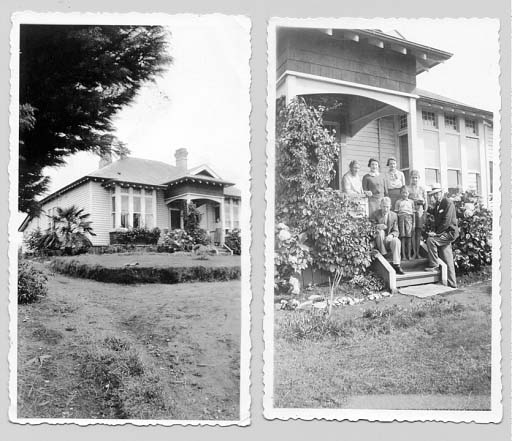 |
|
The Mangarino Road Home |
Mac and Noeline visiting Bob, Blanche, Lottie & her boys Bob and George |
Their daughter Lottie lived there with
her two sons Bob and George, and kept house for them for many years. The boys"
cousin Bob Cole also lived with them when he was about six or seven and has
written a very descriptive account of that time titled "Living in Te Kuiti".
Apparently Blanche had difficulty
catering for a household of reduced numbers and tended to prepare large cakes
that, as they became a bit stale, would appear embellished with icing, then next
day maybe with a jam filling and the next with cream and hundreds and thousands
sprinkled on top. Lottie would sometimes help by quietly cutting a generous
portion when her mother wasn't looking and retreating out the back door saying,
"I wonder if the ducks would like a bit of Grandma's cake?"
Both at Paraketu and later at Te
Kuiti, there was a constant stream of visitors who stayed for varying lengths of
time. They enjoyed Blanche's gentle hospitality and Bob's enthusiasm for
spinning yarns.
After Lottie left to marry Harry
Middleton, the big house became impractical and they moved to a cottage
adjoining their son Mac and his wife Noeline's home in Tammadge Street on the
outskirts of town.
Mac and Noeline took excellent care of
them and made them very comfortable in their wee cottage. It was the first house
they had lived in with an indoor toilet. Noeline was horrified by Blanche's
habit of reading in bed at night by the light of a single candle. She never
caused a fire - unlike her husband who burned holes in everything with his
smoking.
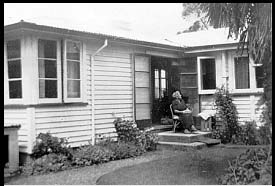 |
|
Blanche sitting in the sun in front of the cottage |
A great speciality in later years was
the production of pale purple organza lavender- bags delicately tied with darker
purple ribbon. Her list for December 1941 records a total of seventy lavender
bags and those were only the ones being posted! Then there were the woolly
slippers: Everyone who visited had the outline of their bare foot drawn on a
piece of cardboard and next time they returned, a pair of felt-soled crocheted
slippers awaited them. Blanche never drove a car but walked great distances
around the town dispensing gifts from a cloth-covered basket she carried hooked
over her arm. "I'll just take something to poor old Mrs (So-and-so) who has been
poorly" she would say, invariably referring to someone a fraction of her age!
She continued with her great love of gardening and of course gave away much of
the produce. She loved going out to the paddock and raking autumn leaves into
little piles and setting them smouldering; and at least once a year, freshening
up the garden gate with another dab of green paint.
If anyone attempted to help with
chores or gardening she would hover anxiously, all the while imploring one to
leave over, worried you might over work - not something she ever considered for
herself - and then fussing around with cakes and drinks.
Grandma, as she was called her older
age by most of the family, was very deaf and often used a hearing trumpet and
towards the end relied on written notes. She attributed her hearing problem to a
time in early adult life when a neighbour gave her the wrong advice for the
treatment of an ear ailment that resulted in her eardrum bursting. Over the
years Bob developed the habit of shouting at her and then at every one else as
well which, if you didn't know him, could be somewhat intimidating.
Bob died peacefully at the cottage on
the 8th of September 1956. He was ninety-seven.
On the 13th of June 1958, after a
short time in a rest home in Auckland, Blanche died at the age have eighty-six.
Blanche was a wonderfully generous
person, always preparing gifts for friends, relatives and even chance visitors.
All her life she was a prolific correspondent keeping in constant touch with
family and friends - every letter and gift she sent recorded in hard-backed
exercise books so that nobody was overlooked. Her records for 1942 alone show
over two hundred and fifty dispatches. She used to say that when she died they
would probably stick a pair of woolly slippers on her gravestone! She was
extremely kind and caring and much loved by all fortunate enough to know her.
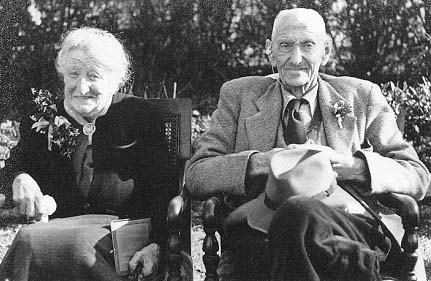
Mr and Mrs R
B Cole ~
Diamond Wedding 1955
Contact us
at
cole@familycole.net Return to Home
Page
 Amy
and Blanche were four and two years of age respectively when they arrived with
their Mother in Napier on the sailing ship Ballarat, 15 September 1872.
The rest of the children were born in New Zealand. Blanche remembered being the
centre of attention with the sailors on board ship as she sat on her potty,
tilting from side to side to stay upright with the movement of the ship. Dick
had arrived earlier to organise for his family's arrival. After a voyage of
three months she did not recognise her father and became alarmed when her mother
embraced this strange bearded man at the bottom of the gangplank.
Amy
and Blanche were four and two years of age respectively when they arrived with
their Mother in Napier on the sailing ship Ballarat, 15 September 1872.
The rest of the children were born in New Zealand. Blanche remembered being the
centre of attention with the sailors on board ship as she sat on her potty,
tilting from side to side to stay upright with the movement of the ship. Dick
had arrived earlier to organise for his family's arrival. After a voyage of
three months she did not recognise her father and became alarmed when her mother
embraced this strange bearded man at the bottom of the gangplank.



 Bob
was from near Clones, across the border in County Fermanagh, Northern Ireland.
He spent his first four years in New Zealand on the Chatham Islands. He then
worked in the Northland kauri bush as well as doing various shepherding and
shearing jobs both there and in the Hawke's Bay. He used to reckon that Blanche
was the most beautiful woman in Napier and he had absolutely no idea why she
agreed to marry him. They evidently made a pact whereby, from that day forth,
Bob would never drink in their home and she would never broach the subject of
religion. They stuck to their vows. Some of Blanche's family and friends were
less than enthusiastic at the prospect of her being dragged away into the
wilderness by an apparent heathen. They first lived at Moawhango near Taihape
which was a place of considerable isolation, virtually cut off from the world
during winter. The contrast for Blanche, who was a town girl, must have been
considerable. Even Bob referred to the region as the "abomination of
desolation."
Bob
was from near Clones, across the border in County Fermanagh, Northern Ireland.
He spent his first four years in New Zealand on the Chatham Islands. He then
worked in the Northland kauri bush as well as doing various shepherding and
shearing jobs both there and in the Hawke's Bay. He used to reckon that Blanche
was the most beautiful woman in Napier and he had absolutely no idea why she
agreed to marry him. They evidently made a pact whereby, from that day forth,
Bob would never drink in their home and she would never broach the subject of
religion. They stuck to their vows. Some of Blanche's family and friends were
less than enthusiastic at the prospect of her being dragged away into the
wilderness by an apparent heathen. They first lived at Moawhango near Taihape
which was a place of considerable isolation, virtually cut off from the world
during winter. The contrast for Blanche, who was a town girl, must have been
considerable. Even Bob referred to the region as the "abomination of
desolation."






